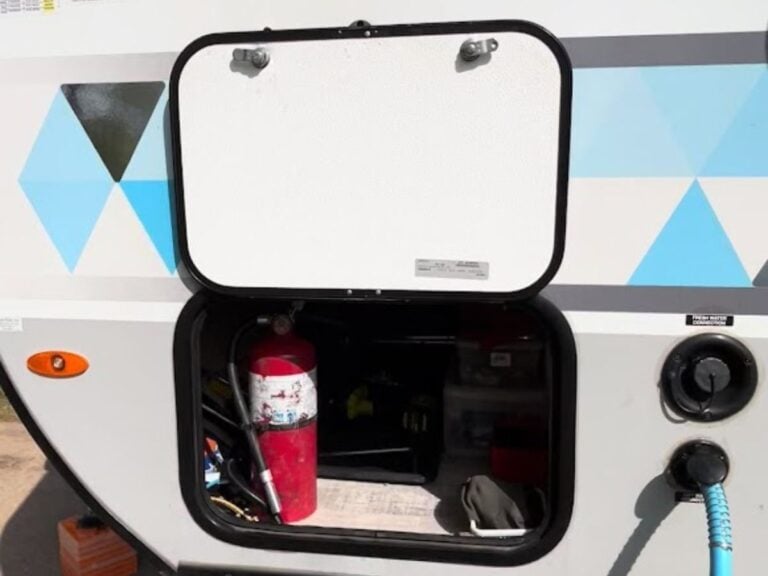This post may contain affiliate links. See our affiliate disclaimer here.
Each year, about 4,200 RVs catch fire in the United States. When RV fires happen, they can spread in seconds. The good news is that many of these fires can be prevented with regular maintenance and a few simple habits. Keep reading for our comprehensive RV fire safety guide.
Contents
What Causes RV Fires
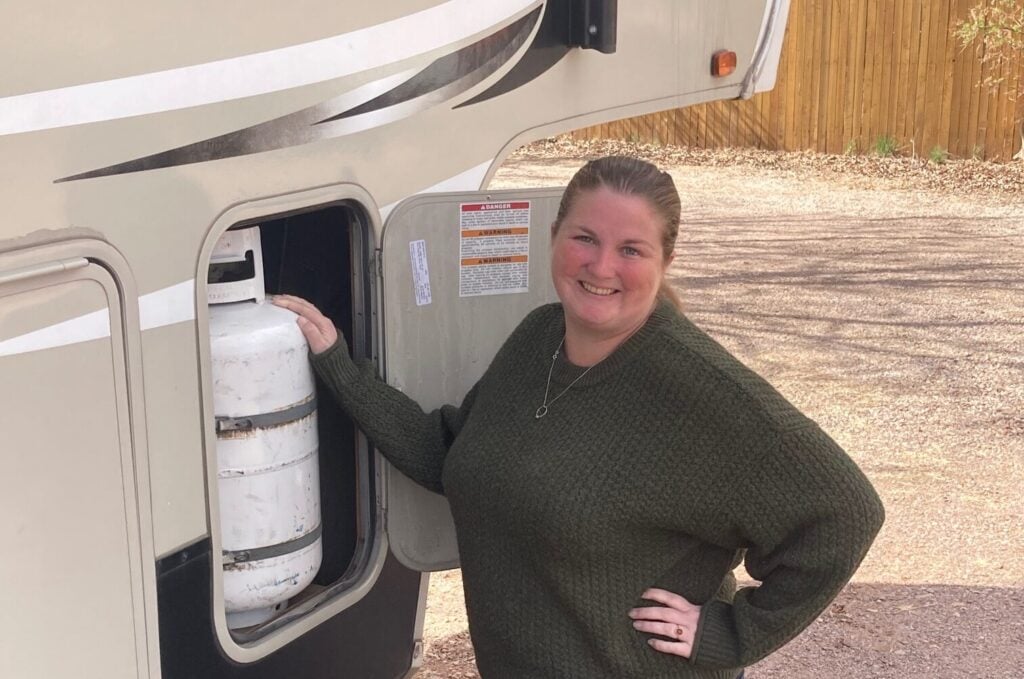
Since an RV has features of both houses and vehicles, there are plenty of places where problems can start. Here are the main culprits.
Engines and running gear
Most RV fires begin here. Overheated brakes, bad bearings, or worn wiring are usually to blame. Schedule regular inspections with a professional mechanic who knows RV systems. It is one of the best ways to catch small issues before they turn into big problems.
Cooking areas
Leaving food on the stove while you run outside for a minute is one of the fastest ways to start a fire.
Electrical systems
Old wires, overloaded outlets, and damaged cords can heat up and spark. Be careful when plugging in multiple appliances. Lithium batteries used in e-bikes or power stations can also be dangerous if they are charged the wrong way.
Propane systems
A propane leak can ignite instantly. Have a certified RV technician inspect your propane system at least once a year. They can test for leaks and make sure your connections are secure.
Refrigerators
Older RV refrigerators can overheat if the area behind them collects dust or debris. Open the exterior service panel and vacuum out dust and debris a few times a year. While you are at it, clean around your water heater and furnace too. Make sure the vents stay open and air can move freely.
How to Prevent Fires in Your RV
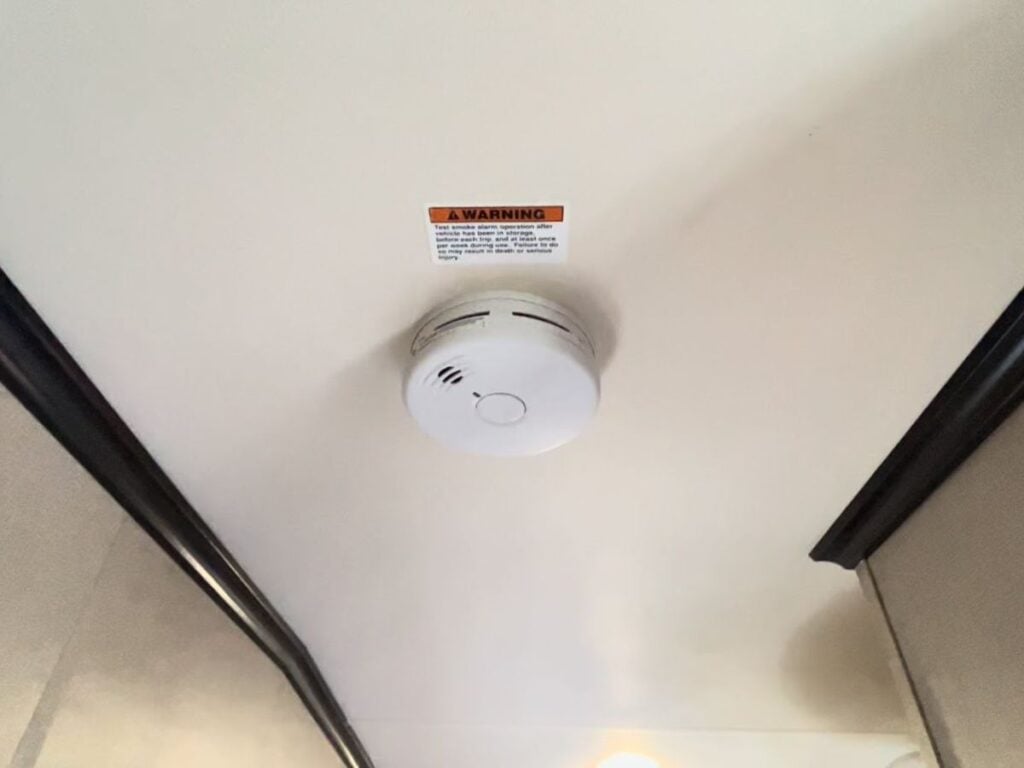
Before You Travel
Do a quick walk around
Look under the RV for leaks, frayed wires, or anything that looks off. Have a professional mechanic do a full inspection at least once a year to check the engine, brakes, propane system, and wiring.
Check propane
If you ever smell propane, shut it off immediately. You can spray fittings with soapy water to check for bubbles, but call a technician for anything beyond that. Make sure your propane detector is working and not expired.
Clean compartments
Wipe out dust and spider webs behind the fridge, furnace, and water heater. Airflow is important for keeping these areas cool.
Test all alarms
Press the test button on your smoke alarm, carbon monoxide detector, and propane detector. Replace any that are expired or not working. They save lives, but only if they work when you need them.
Check for recalls
Make sure your fridge, furnace, and other major appliances are not listed on a fire-related recall.
While Camping
Stay near the stove
Never leave a burner unattended. Keep things like paper towels and dish rags away from the flame. If a pan catches fire, slide a lid on top and turn off the heat. Do not try to carry it outside.
Use heaters safely
Keep space heaters at least three feet away from anything that can burn. Plug them directly into a wall outlet instead of an extension cord. Avoid old coil-style heaters with exposed elements. Always unplug them before bed or when you leave the RV.
Honestly, I wouldn’t use any space heater in my RV.
Charge batteries carefully
Charge e-bikes, scooters, and large battery packs outside when possible. If you must charge inside, set them on a solid surface and keep them away from your exit. Do not charge overnight or when you are not around. Unplug anything that feels hot or smells strange.
Handle fuel the right way
Store gasoline and propane outside your living space in ventilated areas. Never refill a generator that is still warm. Give it time to cool completely first.
On the Road
Trust your nose
If you smell burning plastic or see smoke, pull over right away. Many fires start small, but they can escalate quickly. Get away from the vehicle and stay safe.
Check tire and brake heat
At fuel stops, walk around and hold your hand near each wheel hub without touching it. If one feels much hotter than the rest, you might have a bad bearing or a dragging brake. That kind of heat can start a fire fast.
While Your RV Is Stored
Many RVers assume that once their rig is parked for the season, the fire risk goes away. It doesn’t. Fires can still happen when an RV is sitting in storage. Here’s how to keep your camper safe when it’s not on the road.
Unplug shore power
If your RV will be stored for a while, disconnect from shore power completely. Leaving it plugged in can overheat the converter or wiring and cause a fire.
Turn off propane tanks completely
Close your propane tank valves anytime the RV is not in use. Even a slow leak can fill the rig with gas and create a dangerous situation.
Keep the area clear and ventilated
Make sure the storage space around your RV is clean and free of anything flammable. If you store it inside, keep good airflow so fumes or heat don’t build up.
Disconnect batteries
Before storing your RV, disconnect the batteries completely. This prevents slow drains, corrosion, and electrical shorts that can start while the RV is sitting still.
Inspect before your next trip
Before heading back out, take a few minutes to check for rodent damage, chewed wires, or leaks. Small problems can develop while the RV sits and turn into fire hazards on your next drive.
RV Fire Safety Gear You Should Have
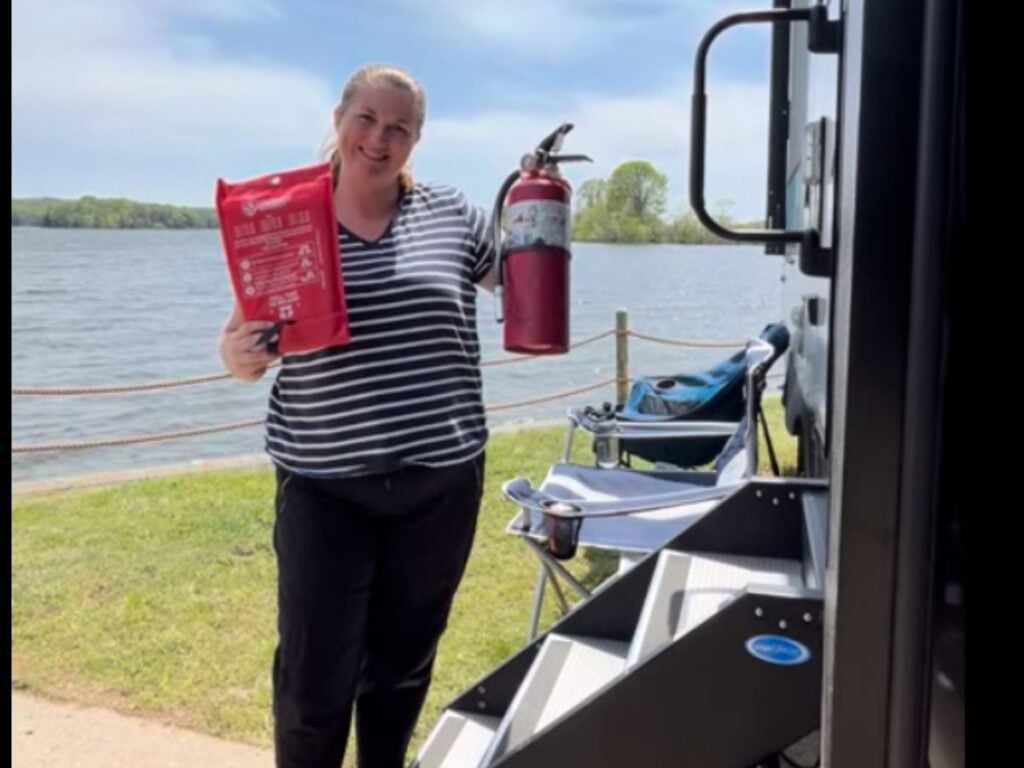
You do not need a lot of equipment, but you do need the right stuff.
Fire extinguishers
Keep three ABC-rated extinguishers. One by the door, one near the bed, and one outside in a storage bay. Make sure everyone knows how to use them, and make sure they are replaced before they expire.
Fire blanket
A fire blanket is perfect for small grease fires and is easier to use than an extinguisher.
Smoke, carbon monoxide, and propane detectors
Keep all of them working and up to date.
Tire pressure monitoring system
A TPMS warns you before a tire gets dangerously hot or loses air.
Surge protector or EMS
Protects your RV from bad campground power that can overheat wires.
What To Do If a Fire Starts
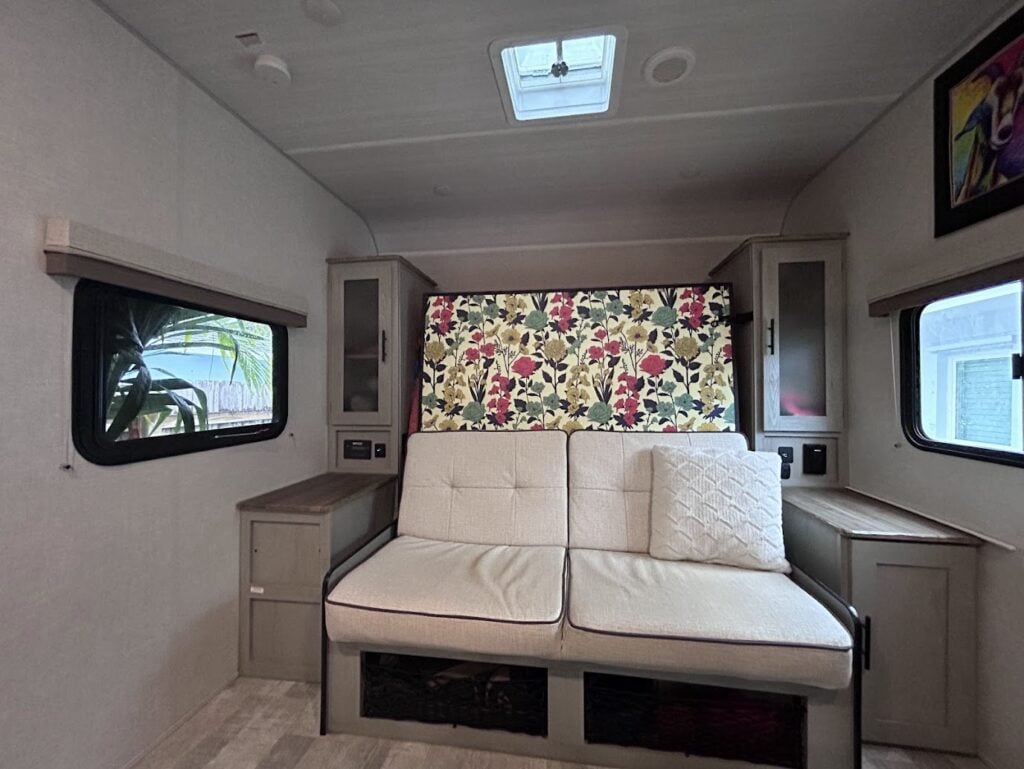
Know your exits
Every person in the RV should know two ways out. Practice using the door and the emergency window so nobody panics in the dark.
Keep your keys handy
Leave keys and a phone in the same spot near the door every night.
Get out fast
If a fire starts inside, everyone should be outside in less than a minute. Once you are out, stay out. Move away from the RV and call for help.
Have a plan for pets
Keep leashes and carriers by the door. You will not have time to search for them in an emergency.
Use the extinguisher only if it is small
If you can see the fire and it is not spreading, use the extinguisher. If it is growing or filling the RV with smoke, just get out. The RV can be replaced, but your family can’t be.
Lithium Battery Safety
Lithium batteries are powerful and helpful, but they need extra care. Only use the charger that came with the device. Charge outside when possible. Stop charging if the battery gets hot or starts to swell. Never charge while you are sleeping or away from the RV.
Campfires and Generators
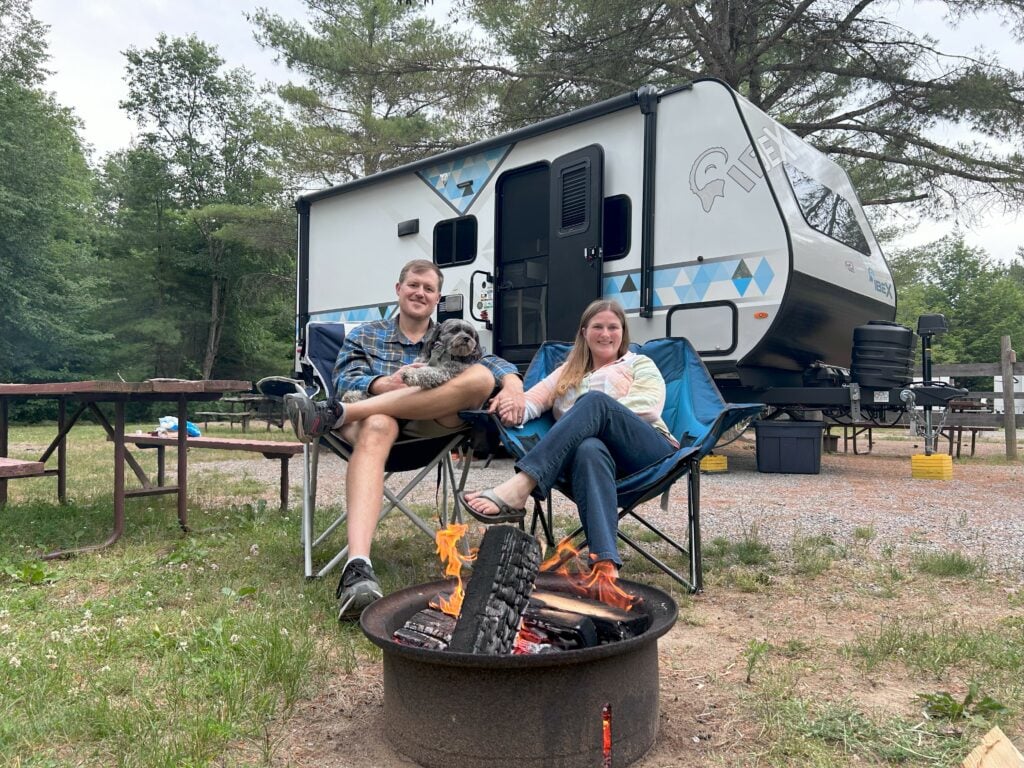
Keep a ten-foot clear space around your campfire. Put it out completely before bed and make sure the ashes are cool to the touch. Follow local fire restrictions.
Let your generator cool before adding fuel, and keep an extinguisher nearby whenever you handle gas.
Insurance and Documentation
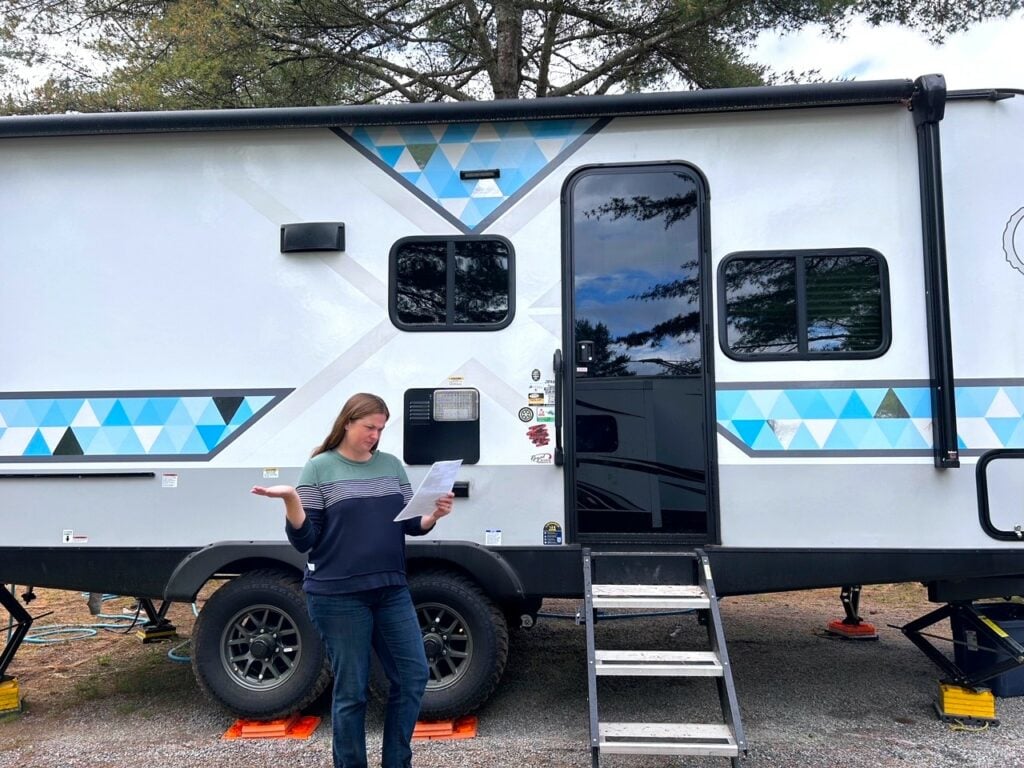
Even when you do everything right, accidents can still happen. Making sure your RV insurance and records are in order can save you a major headache if a fire ever does occur.
Check your policy
Not all RV insurance automatically covers every type of fire damage. Review your policy to make sure it includes fires caused by electrical issues, generators, and lithium batteries. If you’re not sure, call your agent and ask what’s included and what isn’t.
Document your RV’s condition
Once or twice a year, take photos or videos of the inside and outside of your RV. Include any upgrades, appliances, and safety gear. Keep the files stored online or on your phone so you can access them if needed.
Save receipts for maintenance
Hang on to records for professional inspections, propane system checks, or wiring upgrades. Having proof of proper maintenance can make the insurance claim process much smoother.
Update your coverage as your RV changes
If you add solar, new batteries, or other electrical upgrades, let your insurance company know. Adding new systems without updating your policy could affect your coverage.
RV fires spread fast, but prevention is simple. Have your rig inspected by professionals, keep your alarms working, and practice what to do if something goes wrong. Most of all, stay calm and stay ready. Knowing what to do ahead of time could save your RV and everyone in it.
Happy Camping!
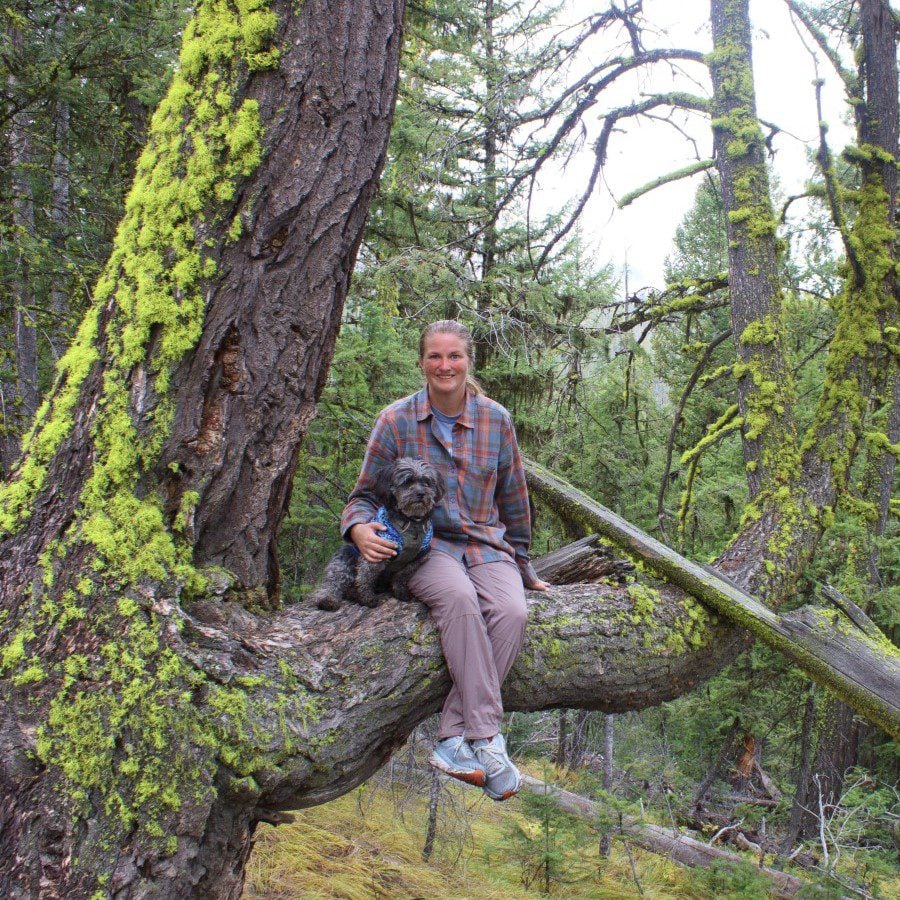
Christina Pate is a seasoned full-time RVer who, along with her husband Justin, has journeyed across the US, Canada, and Mexico. Drawing from her extensive travels, RV repairs and RV renovations, she founded Travels with Ted to guide and inspire fellow RV enthusiasts. Christina is also the co-author of The Owner’s Guide to RV Maintenance and the creator of My RV Log Book.

